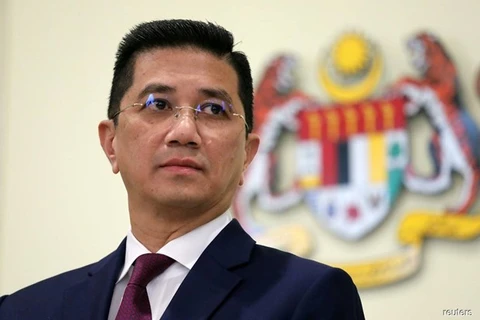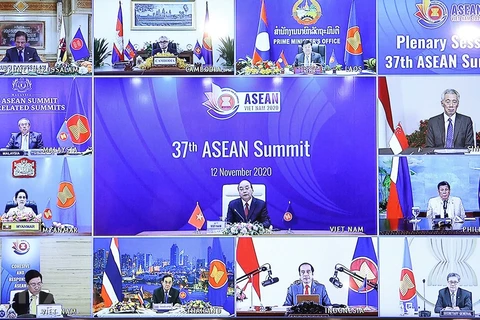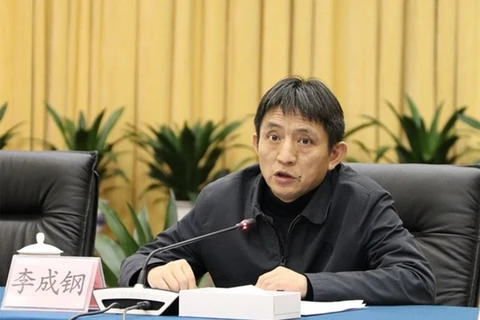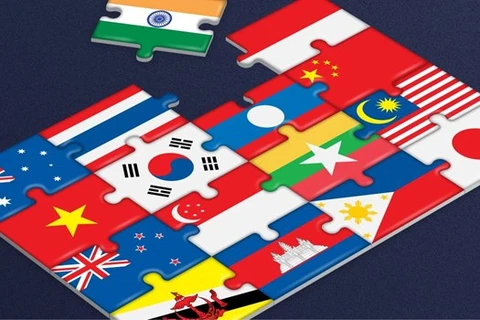 Prime Minister Nguyen Xuan Phuc and Minister of Industry and Trade Tran Tuan Anh at the RCEP signing ceremony. (Photo: VietnamPlus)
Prime Minister Nguyen Xuan Phuc and Minister of Industry and Trade Tran Tuan Anh at the RCEP signing ceremony. (Photo: VietnamPlus)
Hanoi (VNA) - The Regional Comprehensive Economic Partnership (RCEP) Agreement, the world’s largest trade pact, was signed on November 15 by leaders of 15 member countries after eight years of negotiations.
The trade pact involves 10 ASEAN member nations - Brunei, Cambodia, Indonesia, Laos, Malaysia, Myanmar, the Philippines, Singapore, Thailand, and Vietnam, and the bloc’s partners - Australia, China, Japan, the Republic of Korea (RoK) and New Zealand. Together, they account for almost 30 percent of the globe's gross domestic product (GDP) and nearly a third of the world's population.
The agreement is expected to create the world’s largest free trade area and numerous new supply chains, and make significant contributions to regional economic recovery post COVID-19.
In his opening remarks at the 4th Regional Comprehensive Economic Partnership (RCEP) Summit held virtually on November 15, Prime Minister Nguyen Xuan Phuc said the COVID-19 pandemic has harmed global and regional trade and investment flows, including the countries participating in the RCEP talks.
The global and regional economies are facing huge obstacles and challenges caused by not only COVID-19 but also decreased global trade, he said.
“The conclusion of the negotiations of the RCEP, the largest free trade agreement in the world, will send a strong message of ASEAN’s leading role in supporting the multilateral trade system, helping to create a new trading structure in the region,” PM Phuc said.
Speaking at the signing ceremony which was held virtually, Vietnamese Prime Minister Nguyen Xuan Phuc said the new cooperation framework of the RCEP will contribute to accelerating the building of the ASEAN Economic Community 2025, helping ASEAN become a dynamic, strong partner that works for common prosperity.
The signing of the deal is the pride and great achievement of the ASEAN countries and partners in laying a foundation for a new, comprehensive, long-term cooperation period, bringing benefits to all countries in the region.
The PM expressed his hope that the agreement will soon be ratified by the countries and put into place in the time ahead, contributing to post-pandemic economic recovery and bringing prosperity to people and businesses of all the member countries.
Meanwhile, Thai Prime Minister Prayut Chan-o-cha praised the signing of the historic free trade agreement, saying the RCEP agreement was not only the largest free trade agreement in the world but was also characterised by its quality and standards, as well as its positive impact towards the upgrading of the competitiveness and increase economic benefits for all members.
Chinese Premier Li Keqiang said the signing of the RCEP is "a victory of multilateralism and free trade".
With the largest participating population in the world, the most diverse membership and the greatest development potential, the free trade bloc will inject new impetus into regional development and prosperity, and contribute to global economic recovery and growth, Li said.
In an interview granted to the Vietnam News Agency (VNA) on the sidelines of the signing ceremony, Minister of Industry and Trade Tran Tuan Anh, who inked the pact on behalf of Vietnam, described the signing of the deal as a milestone in economic integration of Vietnam and other participating countries.
According to the minister, the RCEP brings opportunities as well as challenges.
First of all, the agreement might add more pressure in terms of competitiveness on Vietnamese goods and services. Many partners have similar products and stronger competitiveness than Vietnamese ones while the quality and value-added content of most Vietnamese products are still modest. Therefore, competitive pressure will increase when the RCEP comes into effect.
However, he said, recent experience in international economic integration has shown that Vietnam’s ability to participate in newly-established value chains in the region is increasing along with the country’s administrative procedure reforms, facilitating business production and improving the investment environment./.























